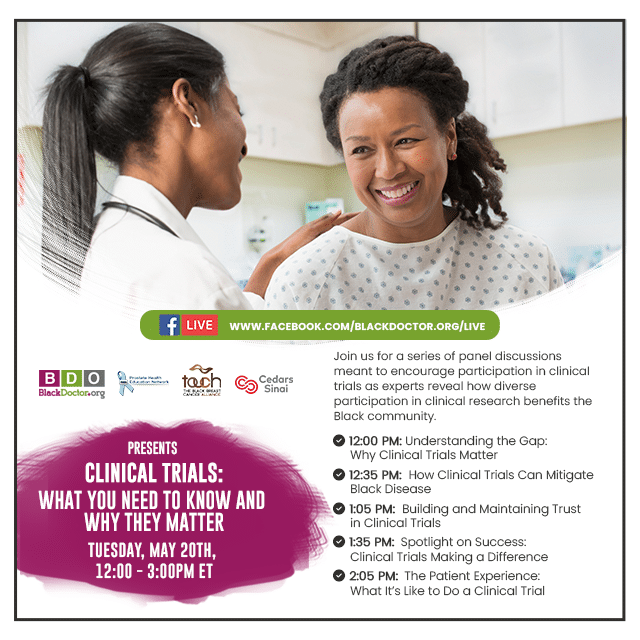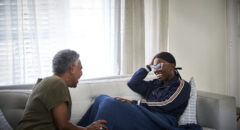
Clinical trials are not just about advancing science—they’re about saving lives. This powerful message resonated throughout our BlackDoctor.org’s Clinical Trials Day Summit on May 20th, where healthcare professionals, pharmaceutical representatives, and patient advocates shared personal experiences and expert insights on the critical importance of Black participation in medical research.
Access to lifesaving treatments
“I would be dead,” stated Ricki Fairley, a triple-negative breast cancer survivor who found a clinical trial after standard treatments failed. “I did all the standard of care stuff. I had a mastectomy, and my cancer came back in a year. And my doctor said, okay. You have two years to live. We don’t have anything for you.”
Through self-advocacy, Fairley found an experimental treatment that saved her life. Her experience underscores a devastating reality: Black Americans are significantly underrepresented in clinical trials despite being disproportionately affected by many diseases.
Not enough research on drugs for Black diseases
Dr. Angela James, Founder & CEO, Diversity Health NetWoRx, highlighted a troubling pattern in medical research: “Trial participants, white males, there are the female population is lower to, 10 in most clinical trials. So we’re using drugs for women. We’re using drugs for other populations that aren’t being studied in the clinical trials.”
This representation gap has serious consequences. As Dr. James explained, “How we absorb it, how we metabolize it, those types of things that really all play into what kind of dose you get, how frequently do you get the dose. Those are all really important. And there are examples, published examples, that talk about drugs that have behaved differently in Black population.”
Dr. Keith Crawford, Director of Clinical Trials and Patient Education at the Prostate Health Education Network, shared a revealing example: “A drug, a clinical trial was conducted at a reputable institution… what he discovered was he had two drugs, drug a and drug b. When drug A was tried on black men, it was the same as drug B. The problem was when you combine the drugs together, it had no impact on white men. But when you combine it together for black men, it doubled the life expectancy.”
Black women aren’t being reached
Despite these clear scientific reasons for diverse participation, barriers persist. Kianta Key, Cultural Marketing Lead at GCI Health, noted: “We surveyed 500 black women and asked them pretty basic questions. Have you ever asked been asked to be a part of a clinical trial? And if you were asked, would you say yes? Most of the ladies we talked to, about seventy-three percent said they have never been asked to be a part of a clinical trial, and almost, forty percent of them were living with a chronic condition.”
Key emphasized this isn’t about Black women being hard to reach: “We are hardly being reached, by folks who where we could benefit from science and the medicine.”
Building a medical trust fund
Patient advocate Karen Peterson described her journey to finding a life-saving trial for her stage 4 triple-negative breast cancer: “I had a four percent chance of survival. I was dying at the time… The trial drugs that saved my life had nothing to do with breast cancer, nothing to do with breast cancer at all.”
Latoya Bolds-Johnson, another triple-negative breast cancer survivor, shared her motivation for participating: “I was building my own medical trust fund for my children.” She explained her participation could help develop treatments that might one day benefit her three daughters.
Addressing risks and fears
Healthcare professionals at the summit emphasized the need for education and community engagement. Dr. Yelba Castellon-Lopez, a research scientist at Cedars-Sinai, advised: “Transparency in both the risks and the benefits of trials, making information and trial-relevant information available to the public in accessible language, explaining the process, expectations, and risks and benefits.”
The panelists urged viewers not to wait until they’re in a health crisis to learn about clinical trials. Tony Lozama, PhD, medical director at Novartis, encouraged: “It’s okay to be afraid. It’s 100% normal…speak to your physician or speak to a physician that you know or has found out that are involved in clinical trials.”
The summit’s message was clear: clinical trials offer cutting-edge treatments that can save lives, and the Black community deserves equal access to these medical advances. As Ricki Fairley concluded, “We’re talking about love. It’s about being able to have a life… We wanna live our lives, and so we need the science.”








